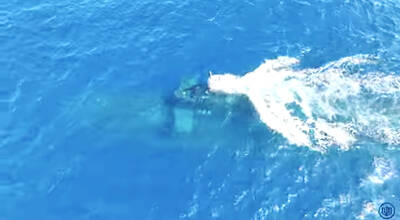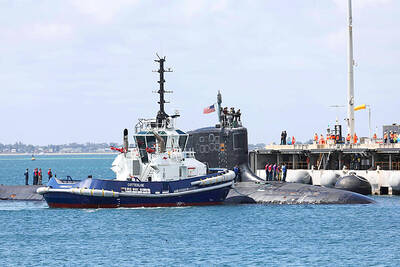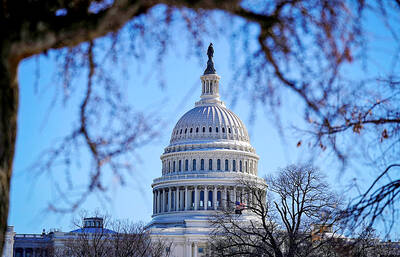The spokesman for China’s Taiwan Affairs Office, Yang Yi (楊毅), said yesterday that both Zhongguo Taibei (中國台北, “Taipei, China”) and Zhonghua Taibei (中華台北, “Chinese Taipei”) are acceptable translations for the official Olympic designation of “Chinese Taipei,” thus threatening to raise tensions between China and Taiwan one month before the Olympics.
In response, the Mainland Affairs Council (MAC) said the development was “a severe mistake,” and it would protest to the International Olympic Committee (IOC).
Yang said that although both translations were acceptable, the Beijing organizing committee (BOCOG) would use Zhonghua Taibei in printed materials and at all venues. But Yang added that the decision was not binding on any other Chinese group, organization or individual.
In Taipei, MAC Vice Chairman Chang Liang-jen (張良任) said “Chinese Taipei” was the name that the Olympic committees of both sides agreed on in 1989 and that the government was firmly opposed to the name “Taipei, China.”
Chang said that in 1989, when the then chair of the Chinese Taipei Olympic Committee, Lee Ching-hua (李慶華), met Chinese Olympic Committee representatives, the two parties agreed that the translation of “Chinese Taipei” would be Zhonghua Taibei.
SARKOZY SAYS OUI
Meanwhile, French President Nicolas Sarkozy will attend the opening ceremony of the Beijing Games next month, his office said yesterday.
Sarkozy told Chinese President Hu Jintao (胡錦濤) he would go to Beijing during a meeting on the sidelines of the G8 summit.
Sarkozy had threatened to boycott the Olympic opening gala following a Chinese crackdown in Tibet in March that sparked international outrage, leading to speculation that some world leaders might shun the Games.
“The head of state consulted all of his European counterparts and, with their agreement, will attend the opening ceremony in his double capacity as president of France and as president of the European Union,” the statement said.
Sarkozy said earlier that his decision on whether to attend the ceremony would hinge on progress in talks between China and the Dalai Lama.
In France, media watchdog Reporters Without Borders (RSF) accused Sarkozy of surrendering to China.
“I am disappointed and bitter. Until the last moment, I kept hoping he would not dare” attend the ceremony, RSF secretary-general Robert Menard said.
“This is a surrender in the middle of battle, an abandonment of all the commitments he made as a candidate and all of the values our country embodies,” Menard said.
He said Sarkozy’s decision was a “stab in the back” to Chinese dissidents, who had been “abandoned” by France.
RSF, which spearheaded protests during the Olympic torch’s global relay, said it was calling for protests outside Chinese embassies worldwide on Aug. 8 and would travel to China to demonstrate in defiance of a ban.
During his meeting with Hu, Sarkozy expressed France’s desire to boost its strategic partnership with China “in all its dimensions” and reiterated French support for Beijing following the May earthquake in Sichuan Province.
French officials said the meeting between Sarkozy and Hu went “extremely well” and the strategic partnership between France and China was “back on track once again.”
Xinhua news agency reported yesterday that tourists would be banned from visiting Beijing’s prestigious Peking University during the Olympics.
The top university will be closed to visitors from July 20 to Sept. 18, Xinhua reported.
The ban will be imposed because of security concerns, Xinhua said, quoting the deputy head of the university’s campus security department.
Teachers, students and staff will have to show identity cards or passes issued by the university to get onto the campus.
The campus, where Olympic and Paralympic table tennis events will be held, is a huge tourist attraction, and every summer thousands of parents take their children there to motivate them to do well in their studies, Xinhua said.

CSBC Corp, Taiwan (台灣國際造船) yesterday released the first video documenting the submerged sea trials of Taiwan’s indigenous defense submarine prototype, the Hai Kun (海鯤), or Narwhal, showing underwater navigation and the launch of countermeasures. The footage shows the vessel’s first dive, steering and control system tests, and the raising and lowering of the periscope and antenna masts. It offered a rare look at the progress in the submarine’s sea acceptance tests. The Hai Kun carried out its first shallow-water diving trial late last month and has since completed four submerged tests, CSBC said. The newly released video compiles images recorded from Jan. 29 to

DETERRENCE EFFORTS: Washington and partners hope demonstrations of force would convince Beijing that military action against Taiwan would carry high costs The US is considering using HMAS Stirling in Western Australia as a forward base to strengthen its naval posture in a potential conflict with China, particularly over Taiwan, the Wall Street Journal reported on Saturday. As part of its Indo-Pacific strategy, Washington plans to deploy up to four nuclear-powered submarines at Stirling starting in 2027, providing a base near potential hot spots such as Taiwan and the South China Sea. The move also aims to enhance military integration with Pacific allies under the Australia-UK-US trilateral security partnership, the report said. Currently, US submarines operate from Guam, but the island could

RESTRAINTS: Should China’s actions pose any threat to Taiwan’s security, economic or social systems, China would be excluded from major financial institutions, the bill says The US House of Representatives on Monday passed the PROTECT Taiwan Act, which states that Washington would exclude China from participating in major global financial organizations if its actions directly threaten Taiwan’s security. The bill, proposed by Republican Representative Frank Lucas, passed with 395 votes in favor and two against. It stipulates that if China’s actions pose any threat to Taiwan’s security, economic or social systems, the US would, “to the maximum extent practicable,” exclude Beijing from international financial institutions, including the G20, the Bank for International Settlements and the Financial Stability Board. The bill makes it clear that China must be prepared

Taiwanese trade negotiators told Washington that Taipei would not relocate 40 percent of its semiconductor production to the US, and that its most advanced technologies would remain in the nation, Vice Premier Cheng Li-chiun (鄭麗君) said on Sunday. “I told the US side very clearly — that’s impossible,” Cheng, who led the negotiation team, said in an interview that aired on Sunday night on Chinese Television System. Cheng was referring to remarks last month by US Secretary of Commerce Howard Lutnick, in which he said his goal was to bring 40 percent of Taiwan’s chip supply chain to the US Taiwan’s almost